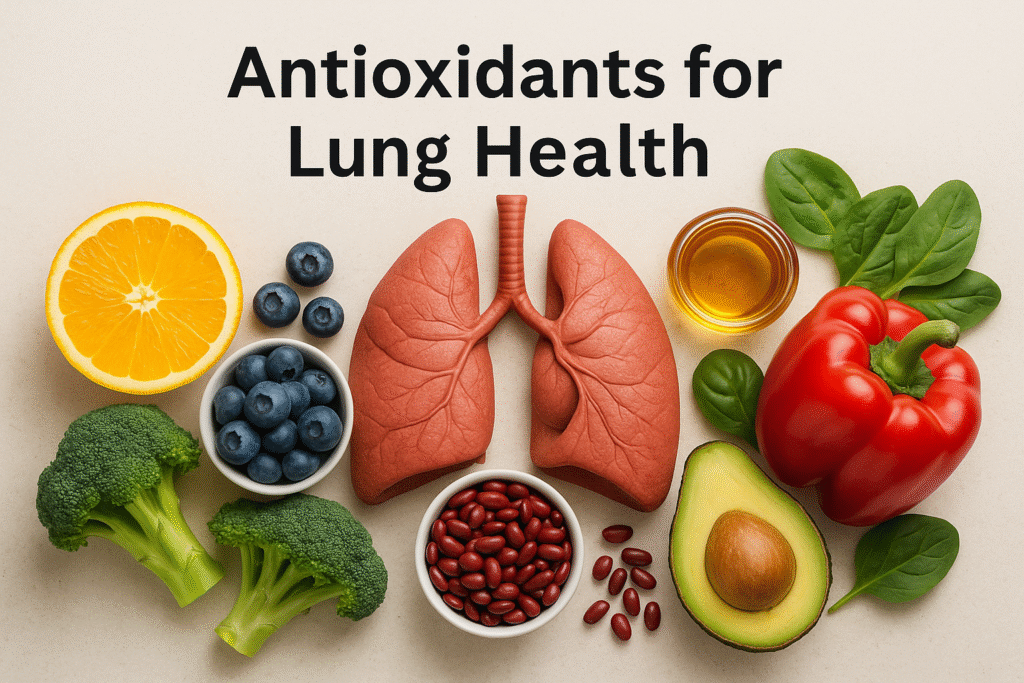Our lungs are under constant stress from environmental pollutants, cigarette smoke, and even the natural aging process. These factors increase the presence of harmful molecules called reactive oxygen species (ROS), which cause oxidative stress and damage lung tissue. Antioxidants for lung health play a critical role in neutralizing these free radicals, helping to maintain optimal respiratory function and prevent chronic lung diseases.
In this article, we explore the powerful relationship between antioxidants for lung health, diving into how these compounds work, which foods are richest in lung-boosting nutrients, and what science says about their role in preventing and managing respiratory conditions.
According to a 2017 study published in Respiratory Research, individuals with higher dietary antioxidant intake had significantly slower declines in lung function over a 10-year period.
What Causes Oxidative Stress in the Lungs?
Lung cells are constantly exposed to oxygen and airborne substances, making them especially vulnerable to oxidative stress. Key sources of lung-damaging oxidative stress include:
- Air pollution (PM2.5, ozone, nitrogen dioxide)
- Cigarette smoke and second-hand smoke
- Occupational exposure to chemicals and dust
- Chronic inflammation from asthma or COPD
- Respiratory infections, including COVID-19
Oxidative stress occurs when there’s an imbalance between free radicals and antioxidants for lung health in the body, leading to inflammation, tissue damage, and accelerated aging of the lungs. Learn more from the American Lung Association.
How Do Antioxidants Support Lung Function?
Antioxidants for lung health are molecules that stabilize free radicals by donating electrons, thereby preventing them from damaging cells. Here’s how natural lung support nutrients benefit lung function:
- Neutralizing Free Radicals: They inhibit the chain reactions triggered by ROS.
- Reducing Inflammation: Some antioxidants for lung health block pro-inflammatory pathways.
- Enhancing Detoxification: Nutrients like N-acetylcysteine boost glutathione production, which detoxifies harmful substances in the lungs.
- Protecting Lung Tissue: They preserve the integrity of cell membranes and alveoli.
For a deeper explanation of antioxidant mechanisms, visit Harvard T.H. Chan School of Public Health.
Top Natural Antioxidants for Lung Health Support
| Antioxidant | Role | Benefits | Top Food Sources |
| Vitamin C | Neutralizes ROS | Reduces inflammation and supports immunity | Oranges, bell peppers, broccoli |
| Vitamin E | Protects cell membranes | Slows lung function decline | Sunflower seeds, spinach, almonds |
| Beta-Carotene | Converts to Vitamin A | Repairs lung tissue | Carrots, sweet potatoes, kale |
| Polyphenols | Anti-inflammatory | Improves lung capacity | Berries, green tea, apples |
| N-Acetylcysteine | Boosts glutathione | Detoxifies lungs | Supplements, poultry, legumes |
| Selenium | Enzyme function | Enhances immune response | Brazil nuts, eggs, whole grains |
Antioxidant-Rich Foods That Boost Lung Health
Adding antioxidants for lung health to your diet is a simple, effective way to support respiratory wellness. Here are some top foods to include:
- Citrus fruits: Rich in vitamin C
- Leafy greens: High in beta-carotene and polyphenols
- Nuts and seeds: Excellent sources of vitamin E and selenium
- Berries: Packed with flavonoids
- Green tea: Loaded with catechins and anti-inflammatory properties
- Garlic and onions: Contain sulfur compounds that support detoxification
Explore antioxidant-rich foods in more detail with this guide from Cleveland Clinic.
Sample Lung-Health Smoothie Recipe:
- 1 cup spinach
- 1/2 cup blueberries
- 1 orange (peeled)
- 1 tbsp chia seeds
- 1/2 cup green tea (cooled)
- Blend and enjoy a daily antioxidant boost!
Antioxidants and Lung Diseases: What the Research Says
Chronic Obstructive Pulmonary Disease (COPD)
Studies show that diets high in antioxidants for lung health are linked to slower progression of COPD and fewer exacerbations. For example, long-term intake of vitamin E and C has been associated with better lung function in older adults.
Asthma
Flavonoid-rich diets have been shown to reduce asthma symptoms and airway hyperresponsiveness.
Lung Cancer
While dietary antioxidants for lung health may help reduce cancer risk, supplementation with high-dose beta-carotene in smokers has been associated with increased lung cancer risk. Whole-food sources are safer. Learn more from the National Cancer Institute.
Post-COVID Lung Recovery
Antioxidants for lung health like NAC, quercetin, and vitamins C and D are being studied for their potential to aid lung recovery and reduce fibrosis post-infection.
A 2022 review in Frontiers in Nutrition supports quercetin’s potential role in lung tissue recovery post-COVID due to its antioxidant and anti-inflammatory effects.
Do Antioxidant Supplements Help Lung Function?
While food remains the best source of antioxidants for lung health, some individuals may benefit from supplementation, especially if they:
- Have nutritional deficiencies
- Are exposed to high pollution levels
- Have chronic lung conditions
Important Note: Always consult a healthcare provider before starting any supplements. High doses of isolated antioxidants for lung health can be harmful, particularly in smokers or those at risk of lung cancer.
Lifestyle Tips to Maximize Lung Health
- Avoid smoking and second-hand smoke
- Exercise regularly to boost lung capacity
- Stay hydrated to thin mucus and improve airflow
- Use air purifiers in polluted environments
- Practice breathing exercises and yoga
- Get regular health screenings
Final Thoughts: Empower Your Lungs with Antioxidants
Your lungs are vital for every breath you take, and protecting them is essential for long-term health. Incorporating antioxidants for lung health and lifestyle practices into your daily routine can significantly improve your respiratory function, reduce inflammation, and slow down the progression of lung-related conditions.
By understanding how antioxidants for lung health work and making informed choices, you can take proactive steps toward better lung health and overall well-being.
Ready to support your lung health naturally? Start by adding more antioxidants for lung health to your diet today. Share this article with someone who could benefit, leave a comment below with your favorite lung-healthy recipe, and don’t forget to subscribe to our newsletter for more science-backed wellness tips. This article is purely informational and intended to help you make more informed health choices.







